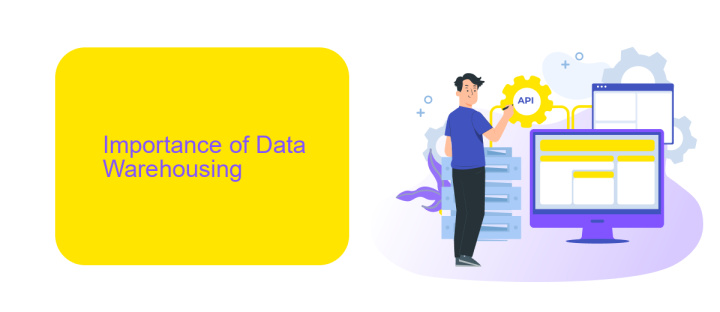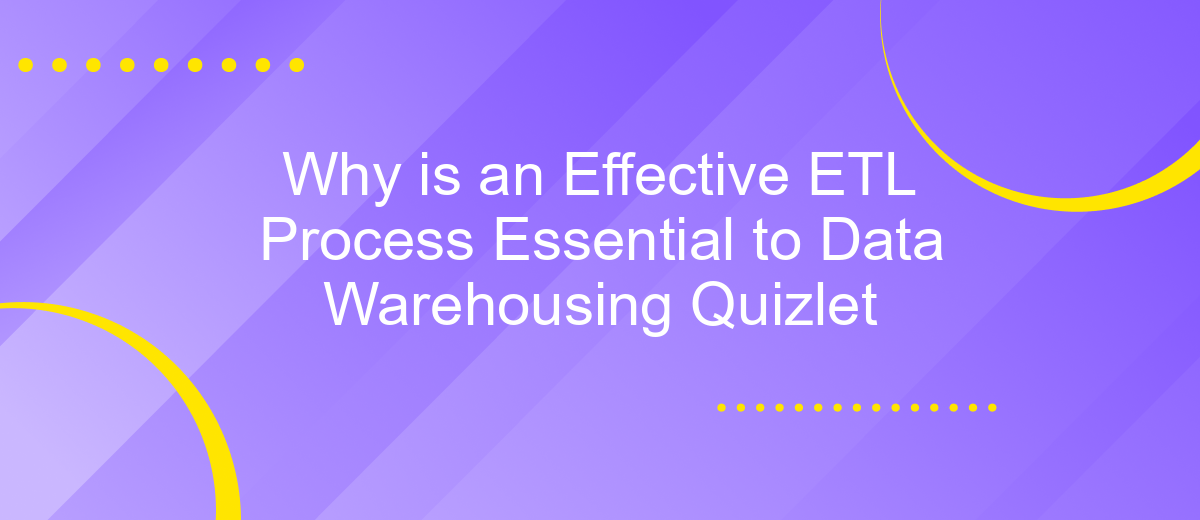Why is an Effective ETL Process Essential to Data Warehousing Quizlet
An effective ETL (Extract, Transform, Load) process is crucial for data warehousing as it ensures the seamless integration and accuracy of data from various sources. By efficiently extracting, transforming, and loading data, ETL processes enable organizations to maintain high-quality, reliable data warehouses, facilitating better decision-making and insightful analytics. This article explores the importance of robust ETL processes in data warehousing.
Introduction
In today's data-driven world, an effective ETL (Extract, Transform, Load) process is crucial for the success of any data warehousing initiative. ETL processes ensure that data is accurately extracted from various sources, transformed into a suitable format, and loaded into a data warehouse for analysis and reporting. A robust ETL process not only improves data quality but also enhances decision-making capabilities.
- Ensures data consistency and accuracy
- Improves data integration from multiple sources
- Facilitates efficient data transformation and loading
- Enhances data quality and reliability
Integrating data from various sources can be challenging, but services like ApiX-Drive simplify this process. ApiX-Drive allows seamless integration of different applications and data sources, ensuring that your ETL process is efficient and reliable. By leveraging such services, organizations can focus on analyzing data rather than spending time on complex integration tasks, ultimately driving better business outcomes.
Importance of Data Warehousing

Data warehousing plays a crucial role in modern data management by providing a centralized repository where data from various sources is consolidated, transformed, and stored. This centralization enables organizations to perform comprehensive data analysis, generate actionable insights, and make data-driven decisions. By integrating data from disparate systems, data warehousing eliminates data silos, ensuring that all stakeholders have access to consistent and accurate information, which is essential for strategic planning and operational efficiency.
Moreover, an effective data warehouse supports advanced analytics, including business intelligence (BI) and machine learning (ML) applications. These capabilities allow businesses to identify trends, forecast future outcomes, and optimize processes. Tools like ApiX-Drive can further enhance the data warehousing process by automating data integration from various sources, ensuring real-time data updates, and reducing manual effort. This automation not only streamlines workflows but also improves data accuracy and reliability, making it easier for organizations to harness the full potential of their data assets.
Benefits of an Effective ETL Process

An effective ETL (Extract, Transform, Load) process is crucial for the success of data warehousing as it ensures that data is accurately and efficiently collected, processed, and stored. This enables organizations to make informed decisions based on reliable data insights.
- Data Accuracy: ETL processes clean and validate data, ensuring that only accurate and relevant information is loaded into the data warehouse.
- Improved Performance: By transforming data before loading, ETL processes optimize query performance and reduce the load on the data warehouse.
- Scalability: ETL tools can handle large volumes of data, making it easier to scale operations as the organization grows.
- Integration: ETL processes can integrate data from multiple sources, providing a unified view of the organization’s data landscape. Tools like ApiX-Drive can facilitate seamless integration across various platforms.
- Compliance: ETL processes ensure that data handling complies with regulatory requirements, thus reducing the risk of legal issues.
In summary, an effective ETL process is indispensable for maintaining the integrity, performance, and scalability of data warehouses. By leveraging tools like ApiX-Drive, organizations can further enhance their data integration capabilities, ensuring that they remain agile and competitive in a data-driven world.
Components of an Effective ETL Process

An effective ETL (Extract, Transform, Load) process is crucial for ensuring the accuracy, consistency, and reliability of data in a data warehousing environment. It involves extracting data from various sources, transforming it into a suitable format, and loading it into a data warehouse for analysis and reporting.
The first component of an ETL process is the extraction phase. During this phase, data is collected from multiple sources such as databases, APIs, and flat files. The quality of the extracted data is critical, as it forms the foundation for subsequent transformations and analysis.
- Extraction: Collecting data from diverse sources.
- Transformation: Cleaning, deduplicating, and reformatting data.
- Loading: Inserting transformed data into the data warehouse.
Transformation is the second component, where raw data is cleaned, deduplicated, and restructured to meet the requirements of the data warehouse. Finally, the loading phase involves inserting the transformed data into the data warehouse. Tools like ApiX-Drive can significantly streamline the integration process by automating data extraction and transformation, ensuring a seamless ETL workflow.
- Automate the work of an online store or landing
- Empower through integration
- Don't spend money on programmers and integrators
- Save time by automating routine tasks
Conclusion
In conclusion, an effective ETL process is indispensable for the success of any data warehousing initiative. It ensures that data is accurately extracted, transformed, and loaded into the data warehouse, providing a reliable foundation for data analysis and decision-making. Without a robust ETL process, organizations risk dealing with inconsistent, incomplete, or outdated data, which can lead to misguided business strategies and operational inefficiencies.
Moreover, integrating tools like ApiX-Drive can significantly streamline the ETL process by automating data transfers between various platforms and services. This not only reduces the manual effort involved but also minimizes the risk of errors, ensuring that the data remains accurate and up-to-date. By leveraging such integrations, businesses can enhance their data warehousing capabilities, leading to more informed decisions and a competitive edge in the market.
FAQ
What is ETL in the context of data warehousing?
Why is an effective ETL process essential to data warehousing?
What are the key components of an ETL process?
How can automation improve the ETL process?
What challenges can arise in the ETL process?
Strive to take your business to the next level, achieve your goals faster and more efficiently? Apix-Drive is your reliable assistant for these tasks. An online service and application connector will help you automate key business processes and get rid of the routine. You and your employees will free up time for important core tasks. Try Apix-Drive features for free to see the effectiveness of the online connector for yourself.


